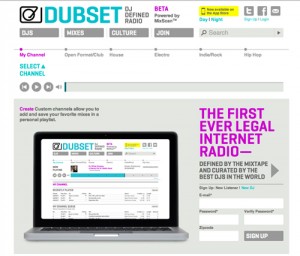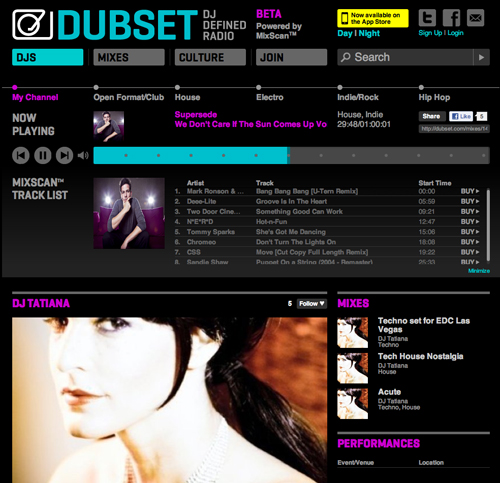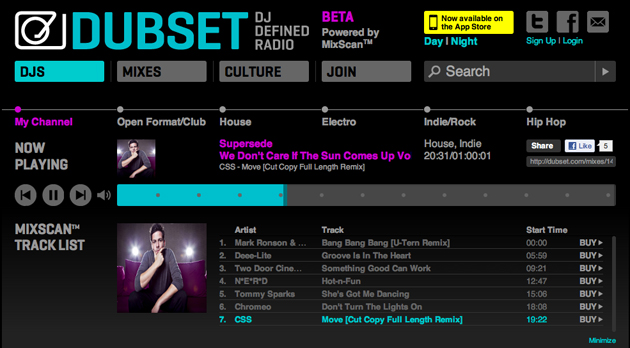 It’s “all about aligning incentives between DJs, recording artists and music fans.” It deifies the mixtape, exalting the streaming content it hosts as the 21st century incarnation of every urbane music fan’s favorite adolescent pastime. Behind the screen, it offers a framework for DJs, promoters and venues to interact and while it can genuinely claim access to a global audience, it bleeds New York. It’s self-described ‘nightlife impresario’ Dave Stein’s streaming mix portal, Dubset.com.
It’s “all about aligning incentives between DJs, recording artists and music fans.” It deifies the mixtape, exalting the streaming content it hosts as the 21st century incarnation of every urbane music fan’s favorite adolescent pastime. Behind the screen, it offers a framework for DJs, promoters and venues to interact and while it can genuinely claim access to a global audience, it bleeds New York. It’s self-described ‘nightlife impresario’ Dave Stein’s streaming mix portal, Dubset.com.
On the surface, Dubset is clean and minimal, built from the same four colors my first computer (pre-x86, circa maybe 1988) could handle: black and white, pink and blue. I’m not sure if that’s a deliberate throwback to cassette-tape era computing, but coupled with the sleek design, it registers with a kind of clinical nostalgia, and I can’t tell if I feel welcome or a bit uneasy.
Most notable about the design is its impressive modular organization. It’s built as a collection of discrete frames, so you navigate the whole site without ever leaving the page you landed on. This is great – the music player loads in the top of the page and is never interrupted, while you dig around through the offerings.
Genres range from 80s rock to dubstep to downtempo to funk, albeit with some selections pretty sparsely peopled. DJs are registered contributors who provide photos, bios and contact details, and whose Twitter feeds show up in another neat little module.
They’re attracted by the promise of a big audience and powerful analytics to track fans; by the chance to liaise directly with venues, ‘major brands and advertisers;’ and by the promise of online ticket sales to come. Being featured on the front page with superstars like Felix Da Housecat (who’s a Dubset Evangelist) is pretty enticing, too.
Then there’s Dubset’s claim that it’s the world’s only legal mix streaming site. Now, I don’t know if that’s accurate, but it’s a pretty contentious claim and its sole purpose is to spruik the site’s behind-the-scenes hero, proprietary track recognition software called MixSCAN.

MixSCAN runs in the background and identifies individual songs within a mix. The info is beamed to ASCAP so the artists get paid their royalties. It is used to populate the tracklist and link to iTunes and Amazon, where you can buy them with a couple of clicks. This is the backbone of Dubset’s main claim to distinction; the core around which a reasonable body of material and a trendy skin have grown. But – and it’s a big but – MixSCAN is hit and miss. Often it’s flawless, and if that standard can be maintained, MixSCAN could be truly revolutionary far, far beyond the scope of this site. Unfortunately it gets confused from time to time, doubles up or misses songs and you’ll hear twelve minutes of a mashup without the tracklist updating. I’d love to see how it handled something with really complicated sampling like The Avalanches’ seminal Since I Left You.

MixSCAN has the potential to fundamentally change the way DJ culture evolves online over the next decade – the idea is that powerful. I’m not as optimistic for Dubset itself, though, despite its polish. It’s just a bit too cool for school, and intentionally so, I gather, but it’s a fine line to walk between maintaining your standards and ostracizing the community that provides your content. Or maybe I’m just a dag.




